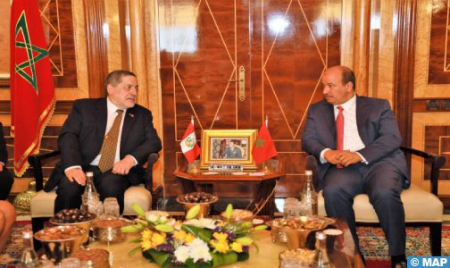Upper House Speaker Holds Talks with Peruvian Parliamentary Delegation
House of Councillors Speaker Enaam Mayara held talks, on Monday in Rabat, with a large Peruvian parliamentary delegation led by Carlos Ernesto Bustamante Donayre, President of the Peruvian Congress’ support group for the Moroccan autonomy initiative, to examine ways of boosting bilateral relations. A press release from the upper house indicates that Mayara stressed the particular importance of relations between Morocco and Peru, regretting, however, that the two countries are still unable to promote their relations to the same level of importance in the economic and social fields, as well as in priority areas of cooperation. He explained that this was due to Peru’s “domestic political situation”, and hoped that “current circumstances are temporary and will have no impact on the durability of bilateral relations.” In this respect, he noted that Peru’s position on the Moroccan Sahara issue, the main point of contention between the two countries, does not provide effective support for a definitive and just solution to the artificial conflict over the Moroccan identity of the Southern Provinces, nor does it offer the conditions required to support the political process under the aegis of the United Nations. After informing the Peruvian delegation of the inhumane conditions imposed on the populations sequestered in the Tindouf camps by separatists working for another country’s agenda, Mayara stressed that the country concerned by this issue must today give greater priority to the human aspect over the political, while adopting a neutral position capable of providing real support for efforts to find a realistic, lasting solution accepted by all. In this connection, he welcomed the Peruvian Congress’ initiative to set up a group to support the Moroccan autonomy initiative. He also expressed his conviction that Morocco’s extended autonomy initiative represents a pragmatic, ideal and lasting solution for consolidating peace and achieving development in the region, in view of the international support for this initiative, which the international community considers to be serious and credible, in addition to the fact that it emanates from the will of the Saharawi populations and forms part of a national consensus around the constitutional constants of the monarchy, Islam, the democratic choice and the Kingdom’s territorial integrity.

